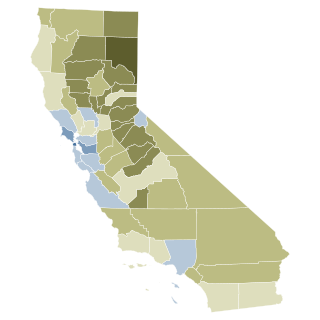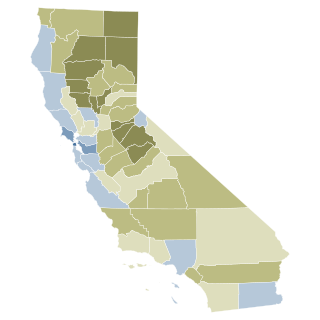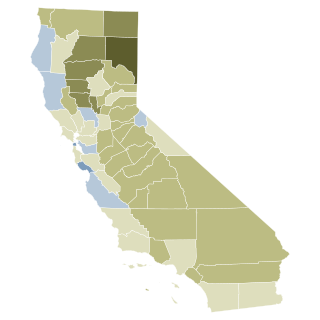
Proposition 61 was a California ballot proposition on the November 2, 2004 ballot. It passed with 6,629,095 (58.3%) votes in favor and 4,750,309 (41.7%) against. The proposition was the result of an initiative and authorized the sale of $750 million in bonds to provide funding for children's hospitals. It was officially known as the Children's Hospital Bond Act of 2004.

Proposition 4, or the Abortion Waiting Period and Parental Notification Initiative, also known to its supporters as Sarah's Law, was an initiative state constitutional amendment in the 2008 California general election.

The California state elections, November 2008 were held on November 4, 2008 throughout California. Among the elections taking place were those for the office of President of the United States, all the seats of California's delegation to the House of Representatives, all of the seats of the State Assembly, and all of the odd-numbered seats of the State Senate. Twelve propositions also appeared on the ballot. Numerous local elections also took place throughout the state.

California Proposition 6, also known as the Safe Neighborhoods Act and The Runner Initiative, is a statutory initiative that appeared on the November 2008 ballot in California. This proposition was rejected by voters on November 4 of that year.

California Proposition 5, or the Nonviolent Offender Rehabilitation Act was an initiated state statute that appeared as a ballot measure on the November 2008 ballot in California. It was disapproved by voters on November 4 of that year.

Proposition 11 of 2008 was a law enacted by California voters that placed the power to draw electoral boundaries for State Assembly and State Senate districts in a Citizens Redistricting Commission, as opposed to the State Legislature. To do this the Act amended both the Constitution of California and the Government Code. The law was proposed by means of the initiative process and was put to voters as part of the November 4, 2008 state elections. In 2010, voters passed Proposition 20 which extended the Citizen Redistricting Commission's power to draw electoral boundaries to include U.S. House seats as well.

California Proposition 7, would have required California utilities to procure half of their power from renewable resources by 2025. In order to make that goal, levels of production of solar, wind and other renewable energy resources would more than quadruple from their current output of 10.9%. It would also require California utilities to increase their purchase of electricity generated from renewable resources by 2% annually to meet Renewable Portfolio Standard (RPS) requirements of 40% in 2020 and 50% in 2025. Current law AB32 requires an RPS of 20% by 2010.

California Proposition 10, also known as the California Alternative Fuels Initiative, was an unsuccessful initiated state statute that appeared on the November 2008 ballot in California. Proposition 10 was funded by Clean Energy Fuels Corp., a corporation owned by T. Boone Pickens. Clean Energy Fuels Corp. is the nation's leading operator of natural gas vehicle fueling stations.

Proposition 12 appeared on the November 4, 2008 ballot in California. It is also known as the Veterans' Bond Act of 2008. The measure was legislatively referred to the ballot in Senate Bill 1572. The primary sponsor of SB 1572 was Senator Mark Wyland, R-Carlsbad. The vote to place the measure on the ballot was passed unanimously in both the California state senate (39-0) and assembly (75-0).

A California Congressional Redistricting Initiative, Proposition 20 was on the November 2, 2010 ballot in California. It was approved by 61.2% of voters. Election officials announced on May 5 that the proposition had collected sufficient signatures to qualify for the ballot. The measure is known by its supporters as the VOTERS FIRST Act for Congress.

Proposition 27 was an unsuccessful ballot proposition on the November 2, 2010 ballot in California, placed there by the initiative process. If approved, this measure would have repealed California Proposition 11 (2008), which authorized the creation of the California Citizens Redistricting Commission to draw the electoral boundaries for State Assembly and State Senate districts. It would also have modified the provision in California law that says that proposed congressional districts can not be subjected to a veto referendum.

Proposition 39 is a ballot initiative in the state of California that modifies the way out-of-state corporations calculate their income tax burdens. The proposition was approved by voters in the November 6 general election, with 61.1% voting in favor of it.

Proposition 51 is a California ballot proposition that passed on the November 8, 2016 ballot, regarding $9 billion in bonds to fund construction and improvement of K-12 and community college facilities. The measure designates $7 billion for K-12 projects falling under four types of projects, and $2 billion for any facility project for community colleges. No other bond measures related to education have been on the California ballot since 2006.

The California state elections in 2020 were held on Tuesday, November 3, 2020. Unlike previous election cycles, the primary elections were held on Super Tuesday, March 3, 2020.

California state elections in 2018 were held on Tuesday, November 6, 2018, with the primary elections being held on June 5, 2018. Voters elected one member to the United States Senate, 53 members to the United States House of Representatives, all eight state constitutional offices, all four members to the Board of Equalization, 20 members to the California State Senate, and all 80 members to the California State Assembly, among other elected offices.

Proposition 13 was a failed California ballot proposition on the March 3, 2020, ballot that would have authorized the issuance of $15 billion in bonds to finance capital improvements for public and charter schools statewide. The proposition would have also raised the borrowing limit for some school districts and eliminated school impact fees for multifamily housing near transit stations.

California Proposition 68 was a legislatively referred constitutional amendment that appeared on ballots in California in the June primary election in 2018. It was a $4.1bn bond measure to fund parks, environmental projects, water infrastructure projects and flood protection measures throughout California.

California Proposition 15 was a failed citizen-initiated proposition on the November 3, 2020, ballot. It would have provided $6.5 billion to $11.5 billion in new funding for public schools, community colleges, and local government services by creating a "split roll" system that increased taxes on large commercial properties by assessing them at market value, without changing property taxes for small business owners or residential properties for homeowners or renters. The measure failed by a small margin of about four percentage points.

California Proposition 14 is a citizen-initiated ballot measure that appeared on the ballot in the 2020 California elections, for November 3, 2020. It authorizes state bonds to be issued worth $5.5 billion, which will fund the California Institute for Regenerative Medicine (CIRM), which serves as the state's center for stem cell research, and enable it to continue its operations. This measure passed with 51% of the vote.

Proposition 30 is a California ballot proposition that appeared in the general election on November 8, 2022. The measure was defeated. The initiative would have raised taxes on the wealthy to fund wildfire management and electric vehicle incentives and infrastructure.








